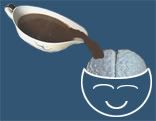Quiz Yourself First
So you read that chapter from your textbook a few times. You seemed to have a strong grasp on the material. Then the test rolls around and… that whole chapter is a blur. You remember some major concepts, that picture at the beginning of the chapter (yet another molecule – real creative…) and maybe you remember question 17.3 – but it wasn’t even that hard.
This is not what you were expecting. Sucks doesn’t it?
How can we prevent such disasters from occurring?
Preparation. And lots of it.
It isn’t enough to merely read the text a few times, and expect to do well. How will you know if you are absorbing the material? This is where problem-based learning comes in. In this case, problem-based learning encompasses asking yourself some questions about the material.
In questioning yourself on the material, you are forcing your brain to go into the retrieval mode that is oh-so-necessary for any test.
Problem-based learning can help you in another way. One of the keys to learning is to have multiple mental pathways that can lead you to the same set of facts.
For example: Let’s say that you are trying to remember how Hamlet’s father was killed.
- The first thing you remember is that he was murdered while sleeping; because you know that Claudius is a rank man-whore. Oh, he was killed in some weird way, no knives or anything like that… something with poison… poison in the ear! Claudius poured poison into Hamlet’s father’s ear!
- Or, you could have only remembered ‘ears’ and eventually reached ‘poison in the ear’ through another pathway.
So to get on the problem-based learning train, you will have to get some questions to ask yourself, or have others quiz you. Ask around, usually people would like this opportunity as well.
Now when asking questions, you have to be real with yourself. Include all material that might show up, even if it is difficult. It is better to get a question wrong in your room seven times, than to lose those marks on a test.
I may have mentioned that I love giving myself questions to learn. If possible, I prefer to incorporate them into broad concepts. It is easier to learn one large idea and its subtopics rather than a bunch of disjointed concepts.
I’ll give you an example of a question I’ve asked myself to study for anatomy (apologies if it flies over your head, I’ll do my best to translate):
How do the epithelial cells (cells lining a space) change along the urethra as we move distally (from the bladder to the external opening)? And relate these changes to functional changes.
(That question sounds a lot harder than it is.) With that question, I am forcing myself to recall the varieties of epithelium along the urethra, while also relating that variation to the change in function.
I do this so that when I have to recall this information later, the potential for numerous mental pathways is large, because the remembered concept is itself large. This increases the likelihood that I will remember the information more readily on a test.
If you are wondering what process you should go through to learn in this manner, it is fairly simple:
- Quickly scan over a small section – i.e. a lecture or one chapter.
- Go through the lecture/chapter again and write questions that will extract the answers in the text from you.
- You may want to put the answers afterwards – it takes more time, but it is easier to retrieve the answer if you are stumped.
- Read the information again.
- Try to answer the questions.
- Find out what you don’t know.
- Do something else (e.g. the next lecture set, jump in some puddles, eat a 72oz. steak, etc.)
- Try answering the questions again.
With this technique, you will find that you can recall information more readily by creating new mental pathways and putting your brain in retrieval mode. So go and ask yourself some questions! Seriously, ask!
If you enjoyed this post, maybe you'll enjoy the others. Please bookmark this page (Ctrl-D) or check out the archive/categories to the right. Better yet, tell a friend!
Labels: Pillars, Self-Awareness, Studying, Test-taking









3 Comments:
wow...how wise...yah...the bio example (i'm assuming it was bio) went totally over my head...but Hamlet example was interesting..i actually have a Shakespeare exam coming up on the 17th...too bad i'm not studying hamlet this year...
othello and lear....hahaha...any tips?
best of luck with exams!
Google for SQ3R oder SQ4R. Sounds similar, huh...
Yes, the SQ3R or SQ4R techniques are essentially the same as the technique in this post. I find that the resources that talk about Survey, Question, Read, Recite, Review or whatever the SQ4R one is are lacking in the specifics.
And most of the techniques mentioned are not new or anything like that - in fact they are quite old; however, we could all use a reminder of good habits every once in a while. :P
Post a Comment
<< Home